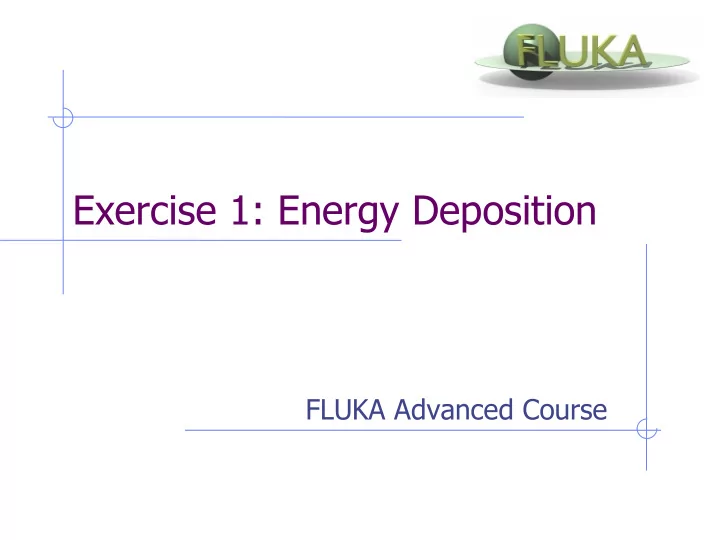

Exercise 1: Energy Deposition FLUKA Advanced Course
Exercise 1a Study case Beam dump of a proton-therapy facility Goal Evaluate the peak and total energy deposition on the dump Requirements Beam settings: 200 MeV protons; Gaussian beam: s x = s y = 1mm, with no divergence; Dump: copper cylinder: 5 cm in radius; 5 cm in length; NB: range of protons@200MeV: ~4.3 cm (from: http://physics.nist.gov/PhysRefData/Star/Text/PSTAR.html) 2
Exercise 1a (II) Tips & Suggestions: Choose option NEW-DEFA in the DEFAULTS card; Set three cylindrical USRBIN detectors, with different radial stepping and maximum radius, in order to compare results: D r 1 =5 s ; D r 2 =1 s ; D r 3 =0.1 s ; R 1,max =5.0cm; R 2,max =1.0cm; R 3,max =0.1cm; In Flair, plot results as longitudinal distributions: ‘Type : 1D Max’ for the peak energy deposition; ‘Type : 1D Projection’ for the total energy deposition (i.e. averaged over the transverse dimension of the scoring mesh); Which plot will show a proper Bragg Peak ? Variations: How do results change when option PRECISIO is chosen in the DEFAULTS card? 3
Exercise 1b Study case Beam dump of a multi-GeV proton accelerator Goal Evaluate the peak and total energy deposition on the dump, and their dependence on the beam dimensions; Requirements Beam settings: 20 GeV protons (x100 wrt previous exercise) Gaussian beam: s x = s y = 1mm, with no divergence ( basic case); Dump: copper cylinder: 5 cm in radius; 25 cm in length (x5 wrt previous exercise); NB: inelastic scattering length of protons@20GeV: 14.6cm; Radiation length: 1.4cm; 4
Exercise 1b (II) Tips & Suggestions: Choose option NEW-DEFA in the DEFAULTS card; Set one cylindrical USRBIN detector, based on the best mesh characteristics from those of the previous exercise; Activate Leading Particle Biasing (through EMF-BIAS card); In Flair, plot results as longitudinal distributions (see previous exercise); Variations: Increase the beam spot size of the basic case by a factor 2 and 8: how do results change? Is there a linear scaling among the simulated cases? 5
Recommend
More recommend